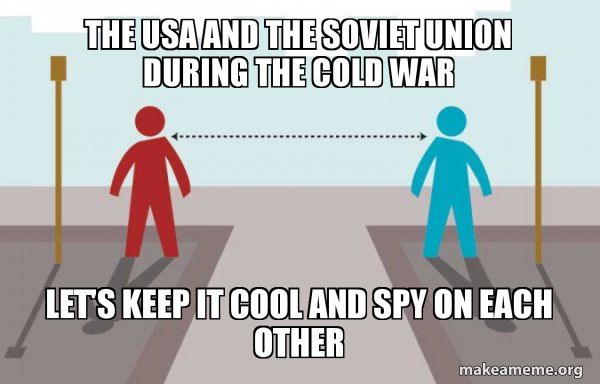What To Know for Your Space Domain Awareness Interview
I wish I knew more about Space Domain Awareness (SDA) when I was in school and interviewing. If you're interviewing for a SDA job, read this article!

Do you have an interview for a Space Domain Awareness (SDA) position coming up? Maybe you're writing a cover letter and applying to SDA openings? Maybe you're just curious if working on SDA would make a good career. Regardless, this is an article written for you!
Space Domain Awareness (SDA) definitions and purpose matter; gathering and understanding information to make high-quality and timely decisions in space is foundational to maintaining peaceful use of space. The history of SDA is inseparable from geopolitics, and being passingly familiar with its story can give you an edge in your interviews. The interdisciplinary nature of SDA means that all STEM fields (and others!) have a place in this growing field.
Let's unroll this confection. In this article, we will 1) understand what SDA is (and is not), 2) learn some non-obvious history and connections to geopolitics, and 3) get an idea of career prospects and interview tips in this field.
Semper cogitare!
1) What Space Domain Awareness is... and isn't
Some History and Synonyms
SDA goes by many synonyms. Well, perhaps another way to say it is that many different terms describe activities that are pretty much the same thing, but with different application areas.
In the dark ages of the Cold War, SDA was generally called Space Surveillance. What is 'Surveillance?'
"Surveillance is the monitoring of behavior, many activities, or information for the purpose of information gathering, influencing, managing, or directing." (Wikipedia)
Here, we're really only talking about information gathering. The 'influencing, managing, or directing' functions are outside the scope of SDA.

As commercial space began to gather steam in the new millennium more spacecraft were being launched than before, and their character was not strictly national. Private companies, universities, and others began launching payloads.
In the noughties, increasing congestion and the first wisps of great power competition lead to a reinvigoration and renaming of space surveillance. The term Space Situational Awareness (SSA) began to take hold. For those few interested readers, I'll mention that the term situational awareness came from human factors and cognitive engineering research. It has everything to do with understanding your local environment to improve decision-making.
A decade later in 2019, weeks before formation of the United States Space Force (USSF), this term was changed to Space Domain Awareness by the United States Air Force (USAF). The meaning is fundamentally the same, however. Switching 'situational' to 'domain' was intended to emphasize that the USAF (and now USSF) cared about the entire space domain, not just the local space situations around their spacecraft.
A Few Definitions
These can come in handy if an interviewer asks you if you know what SDA is. The official USSF definition is:
"Space Domain Awareness (SDA) encompasses the effective identification, characterization, and understanding of any factor associated with the space domain that could affect space operations and thereby impact the security, safety, economy, or environment of our Nation." (pg. 34, Spacepower - Doctrine for Space Forces)
Another definition (this time, my own) also explicitly discusses the purpose of SDA (i.e., to improve decision-making):
"Space Domain Awareness (SDA) includes detection, tracking, characterization, and understanding of objects and actors within and acting upon the space domain now, in the past, and in the future. The purpose of SDA is to enable timely, quality decision-making at the tactical, operational, and strategic levels for all instruments of national power." (The Space Domain Awareness Definition You Wish You Had)
But wait... a lot of institutions still call it Space Situational Awareness. Is there a difference?
Yes, and no. Confused yet?
Let's dig into this.
First, the term SDA is sometimes associated with militarized SSA. Said differently, some people view SDA as SSA when performed by a military entity. While defining SDA as militarized SSA isn't wrong, per se, this usage doesn't help that they have the same scope and functions (i.e., informing decision-making in all of the space domain).
My own preferred approach to distinguishing SSA from SDA has more to do with scope of the SSA / SDA system:
"Space Situational Awareness (SSA) is local and operator-specific; it is focused on enabling decision-making for operations of a single or small formation / constellation of space objects in the Space Domain. Space Domain Awareness (SDA) is the detection, tracking, characterization, and understanding of a fusion of multiple space situational awareness activities within the Space Domain, and facilitates decision-making at the domain scale." (Space Situational or Domain Awareness? Know the Difference!)

For reference, I've written a separate article containing comparisons of a variety of actual SDA systems.
I hope this helps.
SDA is Not...
There are many things that SDA is not.
Chiefest amongst them is that SDA is not...
- about instigating conflict in space.
- an agressive action.
- easy.
SDA is an instrument of peace. Better information results in better decision-making. When it comes to competing national powers and potential conflict in or from space, I believe that we all want the most level-headed and high-quality decisions possible. Carl Sagan agrees:
"Military-reconnaissance and treaty-verification satellites make nations and the global civilization more secure; in a world with tens of thousands of nuclear weapons, they calm the hotheads and paranoids on all sides; they are essential tools for survival on a troubled and unpredictable planet." (pg. 71, Pale Blue Dot)
2) The Frankenstein Creature
SDA did not spring fully-formed from the ether. It began as a union between astronomy, physics, electrical engineering, and computer science. Radar and telescopes, undergoing fits of modernization in the decades following the Second World War, formed the initial core.
Later, during the (first?) Space Race's rush of development for launch vehicles, rendezvous & proximity operations, and systems engineering, astronautics was added to the mix. This was true in both Soviet and Western camps.
Much like aerospace engineering (itself a Frankenstein Monster of mechanical, electrical, physics, and chemistry engineering disciplines), the space surveillance discipline slowly formed. Most individuals that worked in space surveillance wouldn't even have referred to their technical discipline as 'space surveillance;' they would have identified more closely with their formal training disciplines.
Whether we call it space surveillance, SDA, SSA, or space traffic management, the fundamental skillsets, math, tools, methodologies, and phenomenologies remain the same.
Slowly, as rock opera, hip hop, r&b, grunge, techno, trance, and alternative music swept through our culture, decades rolled by. Even now, space surveillance isn't quite its own separate discipline. Certainly not from an academic perspective, though nearly so from a USSF view. The foundational USSF Doctrine identifies SDA as one of its five core competencies (pg. 44, Spacepower - Doctrine for Space Forces).

As form follows function, so does SDA. This mix of topic mastery necessary for SDA systems is its own potion. SDA is a child of the Cold War and Space Race. SDA is a principal cornerstone of international nuclear deterrence. SDA is an instrument of peace.
SDA will play a key role in the Second Space Race.
3) Career Prospects & Interview Tips
What does this mean for you? You've got an interview coming up. History (while perhaps interesting) is not what your interviewers will likely be asking you about!
Growth Potential
With the Second Space Race heating up, the need to keep hot-heads cool, manage increasing levels of space traffic, and overall make good decisions in space is only going to increase. Space economy predictions sport outstanding growth rates, despite mounting demographic drags across the world.
Recent United States national strategies for low-Earth orbit (LEO) and Cislunar space emphasize the growing workforce need for space. That includes SDA.
Possible Employers
Entrepreneurial activity in SDA is strong; there are many small businesses start and succeed every year in meeting SDA-related needs.
Government departments, large and small industry, and academia all sport yawning gaps in SDA human capital. Us academics simply cannot graduate students in related STEM fields fast enough. Government, academic, and industry employers are thirsty for talent.
There is a Place For You in SDA
Because SDA is not a formal discipline, it continues to draw from a wide variety of formal training areas. Astronomers, physicists, chemists, computer scientists, data scientists, and engineers of all stripes can find gainful employment in SDA (frankly, much like aerospace engineering). Just because your interviewer is an electrical engineer doesn't mean you need to be one as well. Do not let imposter syndrome sink its teeth into your headspace.

Interview Tips
There are mountains of tips for engineering- or science-related interviews. I will not repeat generic advice here.
Rather, I've got a few SDA-specific tips:
- Always be ready to say 'I don't know, but...' SDA rewards those who admit their knowledge gaps yet are eager to learn more. Take a beat and be thoughtful with your response, but remember: with a topic as eclectic as SDA, no one knows everything. Don't pretend that you do. There is lots of opportunity to learn.
- All that 'history stuff' can be useful in an interview. Not because you'll get a question on it, but because by remembering it and bringing it up (in context!), you'll indicate that you genuinely have an interest in SDA. Your interviewer will note your potential passion for the topic. They'll see that this isn't just a job for you; they'll understand that you understand the 'why,' and how important successful SDA is to society. You'll leave a strong impression in your favor.
- Be honest about your interests. This is for two reasons. First, SDA has many niches - it's always better for everyone involved if you're placed in a position that best suits you. SDA has enough open positions to where this doesn't necessarily hurt your chances of being hired. Second, precisely because SDA is topically broad and has so many open positions, as a potential employee you run the risk of being placed in an area you won't find engaging.
Go get 'em!
Summary
There are a few principal takeaways:
- Familiarize yourself with SDA definitions and purpose. These statements are relatively short, and you should be able to give versions of them on demand in an interview.
- SDA is very broad. It is a 'Frankenstein Creature' of a large set of STEM fields. You belong. Don't let your interviewer's discipline dictate your self-perception. Successful SDA takes all kinds.
- History of SDA matters. Or, at least, it can be a differentiator. It can indicate passion for the topic. It can help you connect the dots on context or purpose if you find you're in an technical blind spot (owing to the broad set of disciplines in SDA).
If you're interested (or cramming for an interview), read other SDA articles on this website to learn more.
Subscribe to the Newsletter
If you enjoy this content, show your support by subscribing to the free weekly newsletter, which includes the weekly articles as well as additional comments from me. There are great reasons to do so, and subscriptions give me motivation to continue writing these articles! Subscribe today!


